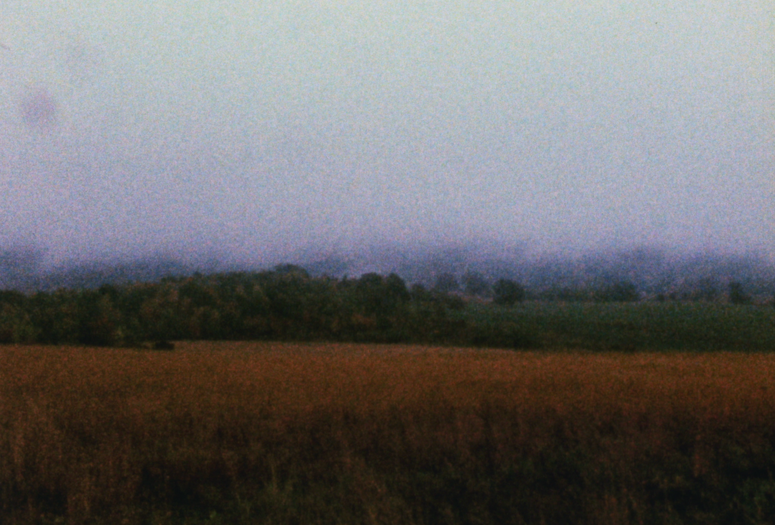In his book, The Red Thread, Larry Gottheim described his experience with Cézanne’s paintings as follows: “I would look for a long time at his still lifes, at a small section of the canvas… I would then turn my gaze to another part of the canvas, each time adjusting my vision to the color experience of the new section. Eventually a section would begin to glow and colors would become more and more radiant.” This is the manifold effect of Horizons (1973), the landmark experimental film he made with the support of Ernie Gehr and Nicholas Ray (who has a cameo), among other filmmakers. Intersplicing color inserts that act as rhythmic barriers between rushes of landscape shots, Gottheim approaches the filming of nature with the eye of a poet and the mind of a scientist.
The constant roll of solid color blocks forms a spine of light in Horizons, operating according to the rules of the seasons. The film begins with summer (green), and proceeds through fall (red) and winter (blue), ending in spring (yellow). Gottheim’s color inserts prepare the eye to see each landscape in a new light. Although he was not as interested in quantum physics as he would become later in his career, Gottheim did rely on poetic pattern systems inspired by Dante to edit Horizons. He broke his shot sequences into a schema of A-A—B-B, A-B-B-A, A-B-A-B relations, working toward a triplet structure for its final section. These patterns allowed Gottheim to sequence visual rhymes between shots so that he could bring out elements of movement, color, and geometry in each frame.
Horizons also represents a turning-point in Gottheim’s cinema, melding his interest in scientific precision with his lyrical sensibilities. The complex structure he adds to his then well-established minimalism invokes the different sensations of each season. Gottheim’s landscapes not only operate in the tradition of the plein-air—as seen in the work of D.W. Griffith, an early cinema pioneer whose penchant for shooting outdoors has inspired experimental filmmakers like Gregory Markopoulos, Nathaniel Dorsky, and Gottheim himself—but expand upon it. Where Cézanne accomplished this transformation in his use of abstraction, so too does Gottheim, modeling in cinema the latter’s statement that “painting from nature is not copying the object; it is realizing one’s sensations.”
Horizons screens this afternoon, May 17, and on May 19, at the Museum of Modern Art on 16mm as part of the series “The Red Thread: Larry Gottheim’s Cinema.”



